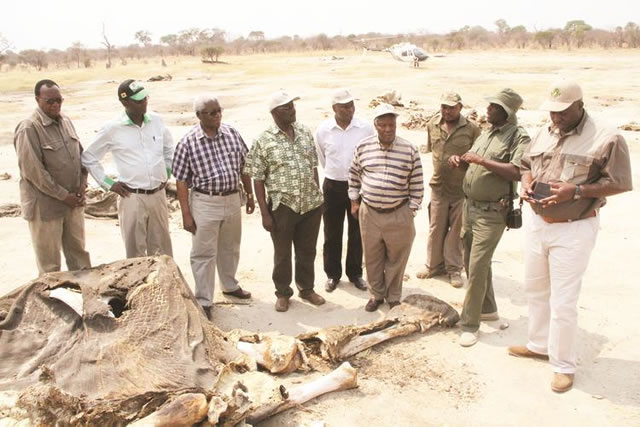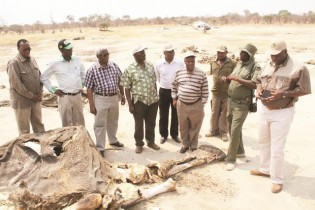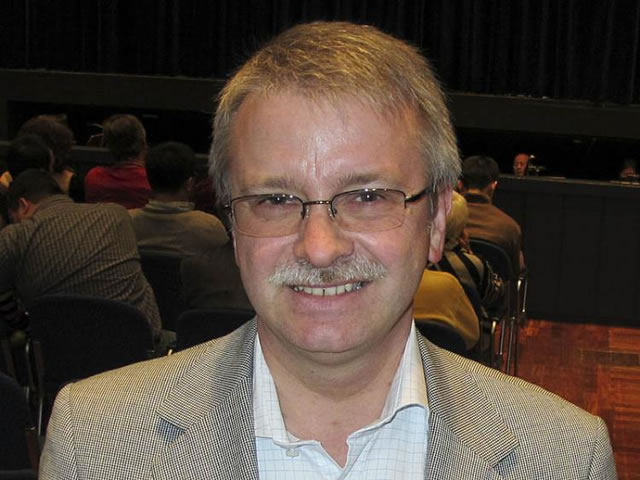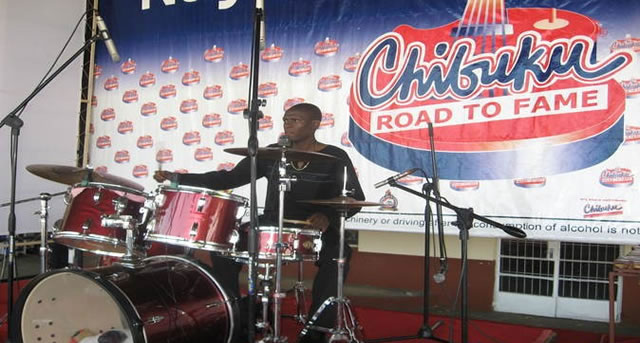Hwange clean-up, de-tox underway


A senior wildlife officer, Mr Patrick Sibanda (second from right), stresses a point to Ministers (from left) Dr Joseph Made, Professor Jonathan Moyo, Dr Ignatius Chombo, Dr David Parirenyatwa, Cde Walter Chidhakwa, Dr Sydney Sekeramayi and Cde Saviour Kasukuwere while Lodzi Hunters ranger Mr Paradzai Nemashakwe listens during a tour of Hwange National Park yesterday
Farirai Machivenyika in HWANGE
THE Zimbabwe Parks and Wildlife Management Authority of Zimbabwe director-general, Mr Edson Chidziya, yesterday said the illegal sanctions imposed on Zimbabwe seriously affected the operations of the organisation with the World Bank withholding US$67 million in assistance it had pledged.
Before the imposition of the sanctions by the United States and its European allies, the United States Agency for International Development and the EU used to be involved in funding operations.
Mr Chidziya said this while addressing a Cabinet delegation that toured Hwange National Park to assess the situation following the deaths of at least 90 jumbos and other animals from cyanide poisoning by poachers.
“The World Bank wanted to come in with US$67 million for aerial surveys and other activities but politics set in and the funds were denied. Our funders are dancing to the tune of their capitals and funding has dried up.
“Some of the areas that were supported include aerial surveys, borehole drilling transport, fuel and so on,” he said.
Mr Chidziya said the authority was facing a number of challenges that included understaffing with one game ranger manning a radius of 200km instead of 20km.
He said at least US$40 million was required to enable the organisation to operate efficiently around its pre-2006 levels. Speaking during the meeting, Defence Minister Dr Sydney Sekeramayi said the army could be called in to assist the authority deal with the scourge of poachers.
“They could come in if need arises,” he said.
Information, Media and Broadcasting Services Minister Professor Jonathan Moyo said it was important that the illegal sanctions be removed to enable the authority operate effectively.
“If those countries that imposed sanctions would remove them it would become unnecessary to deploy the army,” he said.
Environment, Water and Climate Minister Saviour Kasukuwere said Government would step up efforts to deal with poachers.
“We are leaving no stone unturned to smash the scourge of poaching. We are also looking at capacitating the authority in terms of equipment, manpower and other logistical requirements to ensure that it operates effectively.
“We are also happy that he judiciary is also dealing with these poachers as has been seen by the jailing of some of the poachers,” he said.
The other ministers in the delegation included Mines and Mining Development Minister Walter Chidhakwa; Local Government, Public Works and National Housing Minister Dr Ignatius Chombo; Health and Child Care Dr David Parirenyatwa and Agriculture, Mechanisation and Irrigation Minister Dr Joseph Made.
Apart from the elephants other wild animals that have fed from the carcasses have also succumbed from the poisoning prompting the Parks and Wildlife Management Authority to start burning the carcasses while the Environmental Management Authority has de-contaminated the most affected area, and the process is ongoing.
Hwange National Park, Africa’s third largest wildlife sanctuary after Tanzania’s Serengeti and South Africa’s Kruger national parks, covers roughly 14 650 square kilometres, roughly the size of Switzerland, and naturally demands vast resources to effectively police and manage.
Prior to the imposition of the West’s illegal economic sanctions, the National Parks and Wildlife Management Authority had a proud history of effective management, underpinned by an elaborate National Conservation Strategy, introduced by Government in the mid-1980s.
The latest survey conducted by Parks in conjunction with the World Bank, found that the authority needed at least US$40 million to get back on track.
It is still a mystery how, on the back of increased elephant populations of 120 000 against the country’s holding capacity of 56 000 and the sanctions- induced dwindling of human and material resources, the authority has still managed to operate with a paltry 50 rangers against a requirement of 500.
The world standard space for each elephant is one beast per square kilometre, yet in Hwange National Park alone there are 45 000 elephants against a holding capacity of 14 600.
That in itself, entails that the authority actually needed more resources instead of sanctions. Parks has effectively been operating at 54 percent of its operational vehicle requirement and out of that, most of the vehicles are half-runners, making them not only difficult, but dangerous to use.








Comments